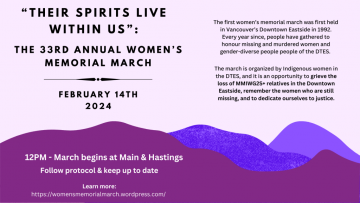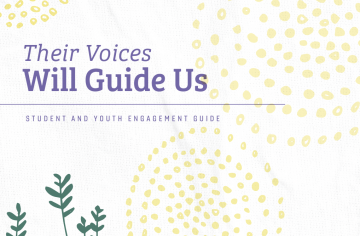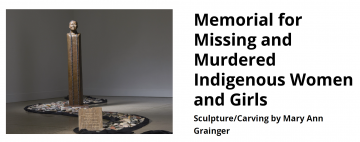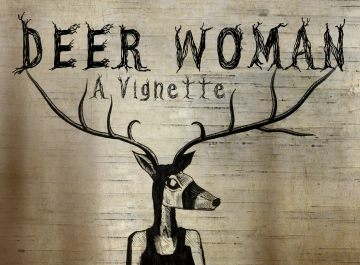Thousands of people will gather in Downtown Eastside Vancouver on Wednesday to honour the lives of missing and murdered Indigenous women, girls, trans and two-spirit people at the 33rd annual Women’s Memorial March (WMM). The WMM is held every year on 14 February, Valentine’s Day, in cities across Turtle Island to remember the ones lost to gender-based violence. It started in 1992 in Vancouver following the murder of Cheryl Ann Joe a member of the shíshálh Nation (Sechelt). The first WMM began as a small memorial but became an annual march that draws thousands of people in many cities every year. This week in the mentoring circle, we pay respects to those who have been lost to colonial violence with digital resources to respond with meaningful action to the MMIWG crisis.
In 2019, the National Inquiry into Missing and Murdered Indigenous Women and Girls released a 1,200-page report with 231 calls to justice aimed at ending genocide. The Final Report of the National Inquiry into MMIWG revealed that persistent and deliberate human and Indigenous rights violations and abuses are the root cause behind Canada’s staggering rates of violence against Indigenous women, girls and 2S/LGBTQ+ people. The two-volume report calls for transformative legal and social changes to resolve the crisis that has devastated Indigenous communities across the country. The Final Report speaks to specific colonial and patriarchal policies that displaced women from their traditional roles in communities and governance and diminished their status in society, leaving them vulnerable to violence.
Their Voices Will Guide Us is an educational and outreach initiative of the National Inquiry intended to facilitate critical thinking, purposeful reflection, and dialogue around the perceptions and lived realities of Indigenous women and girls, including members of 2S/LGBTQ+ communities. The initiative is designed to engage students and teachers in meaningful learning about the important roles of Indigenous women, girls, and Two-Spirit people in their families, communities, and nationals, highlighting their strength, agency and resilience. The goal of the guide is to help shine a light into the dark corners of our collective history, the impacts of colonialism and racism on the lives of Indigenous women, girls and 2S/LGBTQ+ people as well as on their families, communities, and Nations.
Art is a powerful tool for commemoration. Public commemorations, through art, can help bring forward personal stories of colonial violence. Art as commemoration bears witness to injustice, recognizes the human dignity of victims and survivors, and calls institutions, systems and structures to account. An artist can create art as a means of healing from traumatic experiences, or as a way to inspire action. Most powerfully, art provides a platform for voices that may not get an opportunity to share their stories elsewhere. The National Inquiry is honoured to share a Gallery of Artistic Expressions on their website gifted throughout the Truth Gathering Process. The collection features hundreds of gifted pieces including digital music, written poetry, canvas paintings, etched art, books, quilts, and various craft pieces.
The REDress Project is an outdoor art installation by Métis artist Jaime Black that focuses on the crisis of MMIWG across Canada. Through the installation of empty red dresses, Jaime Black hopes to draw attention to the gendered and racialized nature of violent crimes against Indigenous femme bodies and to evoke a presence through the marking of absence. The project is a visual reminder of the staggering number of women who are no longer with us. In her artwork, Black attempts to create a dialogue around social and political issues, especially through an exploration of the body and the land as contested sites of historical and cultural knowledge. The REDress Project positions the indigenous female body as a target of colonial violence while reclaiming space for an indigenous female presence.
Indigenous women and girls have the right to be safe and free from violence. When a woman is targeted with violence because of her gender or Indigenous identity, her fundamental rights are abused and violated. Based on the true stories of Indigenous women throughout the world, Deer Woman: A Vignette, is a powerful expression of empowerment and survivance. Written by Elizabeth LaPensée, this digital comic weaves the stories of Deer Woman into a modern narrative of the struggles of Indigenous women in North America. The comic features self-defence techniques from The Arming Sisters and a powerful introduction from the author; this comic should be read by all who care about the experience of Indigenous women throughout the world! This comic is a free download, get yours today!
In the following TEDxYouth Talk, Rosalie Fish shares how she uses her running ability to bring attention and raise awareness to the alarming epidemic of Missing and Murdered Indigenous Women and Girls. Rosalie Fish is an 18-year-old member of the Cowlitz Tribe and a competitive runner from the Muckleshoot Reservation in Auburn, Washington. Her passions include running, youth empowerment, Indigenous visibility, upholding and practicing local traditions, as well as uplifting and advocating for Native communities and Native women. In May 2019, Rosalie Fish went from being a high school athlete to a nationally known activist. In this talk, she tells the story of the day she decided to wear a red handprint, painted across her mouth, and run for Missing and Murdered Indigenous Women and Girls.
NITEPers if you are planning to attend the 33rd Annual Women’s Memorial March, FNHL and the Sexual Violence Prevention and Response Office are providing resources, supports, and transportation for those who want to attend. Here is the full schedule:
- 9am: Coffee, snacks and medicine bundle making in Sty-Wet-Tan Great Hall
- 10am: Smudging and drumming at the Longhouse Sacred Circle – Indigenous students, staff, and faculty are welcome to bring drums and share a song.
- 11am: Bus departs from the Longhouse
- 11:30am: Arrive at the start site (Carrall St). Refreshments, washrooms, and supports will be available at UBC Learning Exchange (map) for UBC participants, including staff from UBC Counselling Services who will be available for students throughout the event.
- 3:00pm: Bus back to UBC departs from UBC Learning Exchange
FNHL is also hosting an art and community drop-in at the Longhouse for those who don’t want to or can’t attend the march from 12-2pm. If you plan to attend the march and need transportation from UBC, including return, please register. For questions and additional information, contact Olivia, olivia.reynolds@ubc.ca.

Since the first Women’s Memorial March, hundreds of names have been added to the list of women who have gone missing or been murdered in Vancouver’s DTES. Besides providing a powerful vehicle for community mourning and healing, the march draws public attention to the impact of systemic violence against Indigenous women and girls and the traumatic effect on their families following their murders or unsolved disappearances. In the following video, watch how the statue of settler John Deighton, more commonly known as Gassy Jack, was toppled during the 31st annual Women’s Memorial March. For many, Gassy Jack is a symbol of oppression against Indigenous women and girls, noting he was 40 years old when he married a 12-year-old girl from the Squamish First Nation. Bring down the colonial patriarchy!


